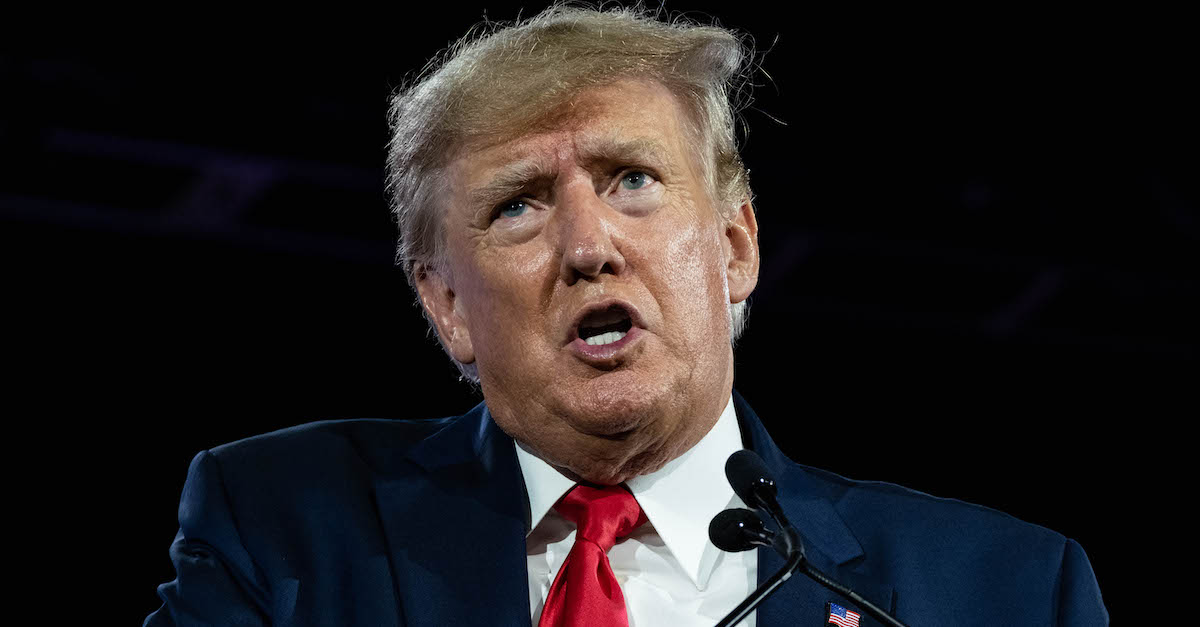
Former U.S. President Donald Trump gives the keynote address at the Faith & Freedom Coalition during their annual “Road To Majority Policy Conference” at the Gaylord Opryland Resort & Convention Center June 17, 2022 in Nashville, Tennessee.
Former President Donald Trump has filed a notice that he will appeal the dismissal of his First Amendment lawsuit against Twitter, documents filed in appellate court reveal.
The 45th president and several additional plaintiffs including anti-vaccine advocates, COVID-19 misinformation spreaders, and conservative activists signaled their intent to appeal by filing a notice of appeal as well as a series of procedural exhibits in a Monday filing with the U.S. Court of Appeals for the Ninth Circuit.
In May of this year, the lawsuit was dismissed by U.S. District Judge James Donato, who found that the content moderation decisions made by Twitter in no way impacted the First Amendment because Twitter is not the government.
“Plaintiffs’ main claim is that defendants have ‘censor[ed]’ plaintiffs’ Twitter accounts in violation of their right to free speech under the First Amendment to the United States Constitution,” the judge noted in an 18-page order. “Plaintiffs are not starting from a position of strength. Twitter is a private company, and ‘the First Amendment applies only to governmental abridgements of speech, and not to alleged abridgements by private companies.””
In an inline citation to case law, the opinion offers a basic distillation of First Amendment doctrine [emphasis in original]:
[T]he Free Speech Clause prohibits only governmental abridgement of speech. The Free Speech Clause does not prohibit private abridgment of speech.
The only possible way for Trump and the other plaintiffs to make a First Amendment claim against Twitter, Donato noted, was the narrowly-applied state action doctrine, which holds that government activity can be viewed as dominating a private activity “to such an extent that its participants must be deemed to act with the authority of the government and, as a result, be subject to constitutional constraints.” But that doctrine, the judge went on, “is not an easy claim to make.”
In response to Twitter’s eventually-granted motion to dismiss, Trump and the others plaintiffs were found not to have strongly argued that the state action doctrine actually applied to their case on the merits. Rather, the thrust of their argument, Donato noted, was a procedural pleading that the inquiry was too fact-intensive to be dealt with on a motion for summary judgment. The judge rejected that out of hand and then described Trump’s pleaded facts.
From the May dismissal:
READ RELATED: The Candy Man Killer Drew In His Accomplices With Hefty Bribes
Twitter is said to have closed Mr. Trump’s account because of “the risk of further incitement of violence” and “threats to physical safety. Twitter closed plaintiff [Linda] Cuadros’s account “due to a post about vaccines,” and Dr. [Naomi] Wolf’s account for “vaccine misinformation”; Plaintiff [Rafael] Barboza’s account was closed “after retweeting President Trump and other conservatives on January 6, 2021,”; plaintiff [Dominick] Latella after he “post[ed] positive messages about Republican candidates and President Trump,” and plaintiff [Wayne Allen] Root for “messages he posted related to COVID-19 and the 2020 election results.”
“If anything, these explanations indicate that Twitter acted in response to factors specific to each account, and not pursuant to a state rule of decision,” the order granting Twitter’ motion to dismiss explained.
Trump and the others cited a handful of comments made by Democratic Party politicians to argue that the state was directing Twitter’s censorial moves, however, the judge noted, “the comments of a handful of elected officials are a far cry from” a rule that is actually being enforced by the state.
“There is no way to allege with any degree of plausibility when, if ever, the comments voiced by a handful of members of Congress might become a law, or what changes such a law might impose on social media companies like Twitter,” Donato went on.
The plaintiffs will soon have to re-litigate their theories of alleged state action in one of the nation’s traditionally most left-leaning and Free Speech-favoring appellate courts.
Substantive pleadings in the case stylized as Trump v. Twitter have yet to be filed.
The notice of appeal is available below:
[image via Seth Herald/Getty Images]
Have a tip we should know? [email protected]
Source:




